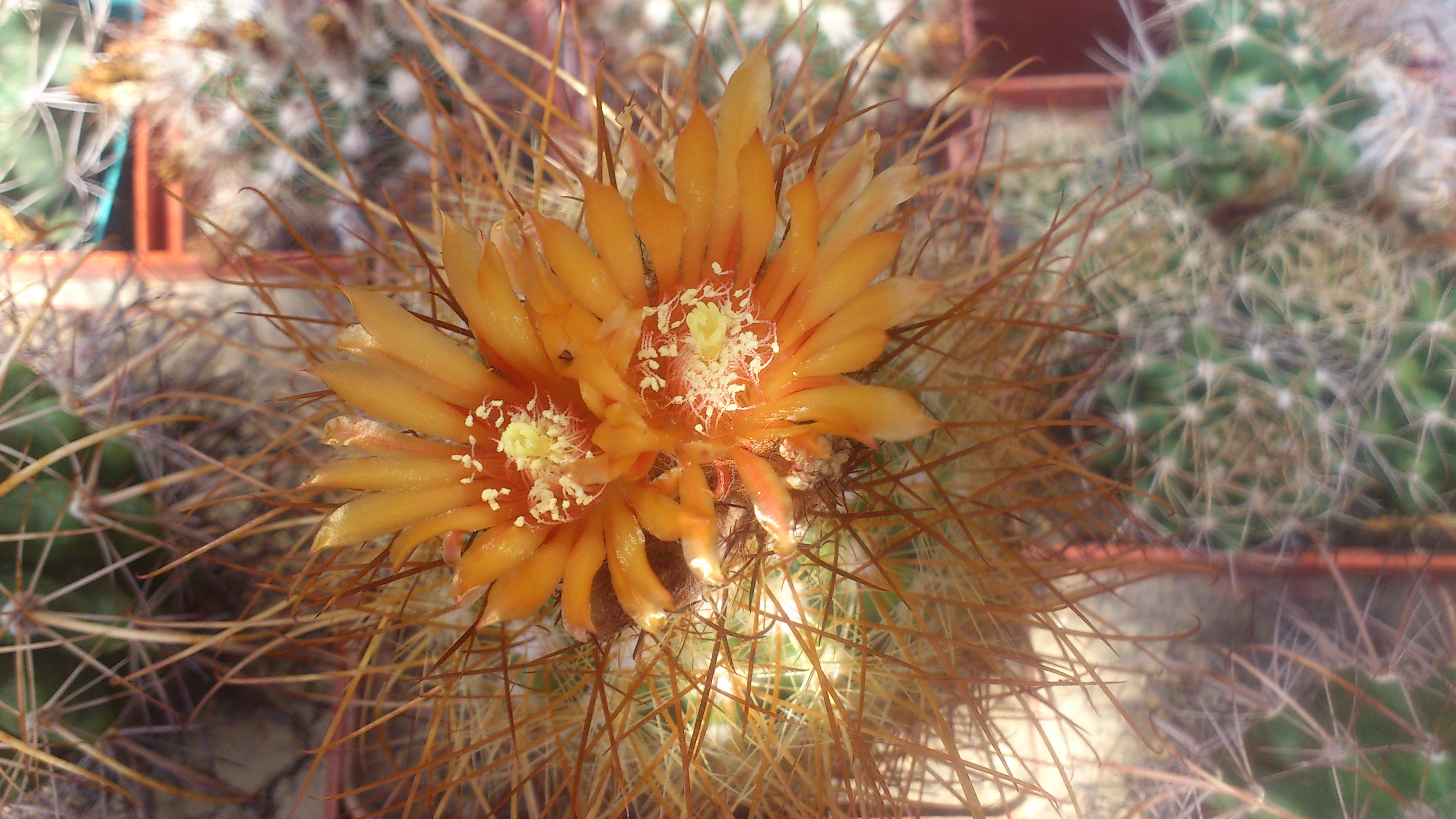|
K. Schum.
Karl Moritz Schumann (17 June 1851 – 22 March 1904) was a German botanist. Schumann was born in Görlitz. He was curator of the Botanisches Museum in Berlin-Dahlem from 1880 until 1894. He also served as the first chairman of the ''Deutsche Kakteen-Gesellschaft'' (German Cactus Society) which he founded on 6 November 1892. He died in Berlin. Karl Moritz Schumann participated as a collaborator in '' Die Natürlichen Pflanzenfamilien'' by Adolf Engler and K. A. E. Prantl and in '' Flora Brasiliensis'' by Carl Friedrich Philipp von Martius. The genera ''Schumannianthus'' ( Gagnepain), ''Schumanniophyton ''Schumanniophyton'' is a genus of three species of small tree native to west Africa and belonging to the family Rubiaceae. It contains the following species and varieties: * '' Schumanniophyton hirsutum'' (Hiern) R.D.Good, native from W. Central ...'' ( Harms), '' Schumannia'' ( Kuntze) and several species were named after him, including: Bibliography * Schumann, ... [...More Info...] [...Related Items...] OR: [Wikipedia] [Google] [Baidu] |
Görlitz
Görlitz (; pl, Zgorzelec, hsb, Zhorjelc, cz, Zhořelec, :de:Ostlausitzer Mundart, East Lusatian dialect: ''Gerlz'', ''Gerltz'', ''Gerltsch'') is a town in the Germany, German state of Saxony. It is located on the Lusatian Neisse River, and is the largest town in Upper Lusatia as well as the second-largest town in the region of Lusatia, after Cottbus. Görlitz is the easternmost town in Germany (easternmost village is Zentendorf, Zentendorf (Šćeńc)), and lies opposite the Poland, Polish town of Zgorzelec, which was the eastern part of Görlitz until 1945. The town has approximately 56,000 inhabitants, which make Görlitz the List of cities in Saxony by population, sixth-largest town in Saxony. It is the seat of the Görlitz (district), district of Görlitz. Together with Zgorzelec, it forms the Euro City of Görlitz/Zgorzelec, which has a combined population of around 86,000. While not Sorbian languages, Lusatiophone itself, the town is situated just east of the Sorbian la ... [...More Info...] [...Related Items...] OR: [Wikipedia] [Google] [Baidu] |
Abelia Schumannii
''Linnaea parvifolia'', synonym ''Abelia schumannii'', is a species of flowering plant in the family Caprifoliaceae, native to central China. It is a semi-evergreen In botany, an evergreen is a plant which has foliage that remains green and functional through more than one growing season. This also pertains to plants that retain their foliage only in warm climates, and contrasts with deciduous plants, whic ... shrub growing to tall by broad. Pink flowers with red calyces are produced in late summer and autumn. In cultivation it requires a sheltered, south-facing aspect. It is valued as a late-flowering ornamental garden shrub. References {{Taxonbar, from1=Q50233174, from2=Q10958064, from3=Q4666680 Caprifoliaceae Flora of China Shrubs ... [...More Info...] [...Related Items...] OR: [Wikipedia] [Google] [Baidu] |
People From Görlitz
A person ( : people) is a being that has certain capacities or attributes such as reason, morality, consciousness or self-consciousness, and being a part of a culturally established form of social relations such as kinship, ownership of property, or legal responsibility. The defining features of personhood and, consequently, what makes a person count as a person, differ widely among cultures and contexts. In addition to the question of personhood, of what makes a being count as a person to begin with, there are further questions about personal identity and self: both about what makes any particular person that particular person instead of another, and about what makes a person at one time the same person as they were or will be at another time despite any intervening changes. The plural form "people" is often used to refer to an entire nation or ethnic group (as in "a people"), and this was the original meaning of the word; it subsequently acquired its use as a plural form of ... [...More Info...] [...Related Items...] OR: [Wikipedia] [Google] [Baidu] |
19th-century German Botanists
The 19th (nineteenth) century began on 1 January 1801 ( MDCCCI), and ended on 31 December 1900 ( MCM). The 19th century was the ninth century of the 2nd millennium. The 19th century was characterized by vast social upheaval. Slavery was abolished in much of Europe and the Americas. The First Industrial Revolution, though it began in the late 18th century, expanding beyond its British homeland for the first time during this century, particularly remaking the economies and societies of the Low Countries, the Rhineland, Northern Italy, and the Northeastern United States. A few decades later, the Second Industrial Revolution led to ever more massive urbanization and much higher levels of productivity, profit, and prosperity, a pattern that continued into the 20th century. The Islamic gunpowder empires fell into decline and European imperialism brought much of South Asia, Southeast Asia, and almost all of Africa under colonial rule. It was also marked by the collapse of the large S ... [...More Info...] [...Related Items...] OR: [Wikipedia] [Google] [Baidu] |
1904 Deaths
Nineteen or 19 may refer to: * 19 (number), the natural number following 18 and preceding 20 * one of the years 19 BC, AD 19, 1919, 2019 Films * ''19'' (film), a 2001 Japanese film * ''Nineteen'' (film), a 1987 science fiction film Music * 19 (band), a Japanese pop music duo Albums * ''19'' (Adele album), 2008 * ''19'', a 2003 album by Alsou * ''19'', a 2006 album by Evan Yo * ''19'', a 2018 album by MHD * ''19'', one half of the double album ''63/19'' by Kool A.D. * ''Number Nineteen'', a 1971 album by American jazz pianist Mal Waldron * ''XIX'' (EP), a 2019 EP by 1the9 Songs * "19" (song), a 1985 song by British musician Paul Hardcastle. * "Nineteen", a song by Bad4Good from the 1992 album '' Refugee'' * "Nineteen", a song by Karma to Burn from the 2001 album ''Almost Heathen''. * "Nineteen" (song), a 2007 song by American singer Billy Ray Cyrus. * "Nineteen", a song by Tegan and Sara from the 2007 album '' The Con''. * "XIX" (song), a 2014 song by Slipknot. ... [...More Info...] [...Related Items...] OR: [Wikipedia] [Google] [Baidu] |
1851 Births
Events January–March * January 11 – Hong Xiuquan officially begins the Taiping Rebellion. * January 15 – Christian Female College, modern-day Columbia College, receives its charter from the Missouri General Assembly. * January 23 – The flip of a coin, subsequently named Portland Penny, determines whether a new city in the Oregon Territory is named after Boston, Massachusetts, or Portland, Maine, with Portland winning. * January 28 – Northwestern University is founded in Illinois. * February 1 – ''Brandtaucher'', the oldest surviving submersible craft, sinks during acceptance trials in the German port of Kiel, but the designer, Wilhelm Bauer, and the two crew escape successfully. * February 6 – Black Thursday in Australia: Bushfires sweep across the state of Victoria, burning about a quarter of its area. * February 12 – Edward Hargraves claims to have found gold in Australia. * February 15 – In Boston, Massachusetts, ... [...More Info...] [...Related Items...] OR: [Wikipedia] [Google] [Baidu] |
Vangueria Schumanniana
''Vangueria'' is a genus of flowering plants in the family Rubiaceae. The genus is named for , as ''Vangueria madagascariensis, V. madagascariensis'' is known in Malagasy language, Malagasy. Distribution The genus contains over 50 species distributed in Africa south of the Sahara with one species occurring in Madagascar (''Vangueria madagascariensis, V. madagascariensis''). The centre of diversity is in East Africa (Kenya, Tanzania) and they are rare in West Africa. Bacterial leaf symbiosis Endophytic bacteria are housed in the intercellular space of the leaf mesophyll tissue. The presence of these bacteria can only be microscopically ascertained. The bacteria are identified as ''Burkholderia'', which is a genus that is also found in the leaves of other Rubiaceae species. The hypothesis is that these endophytic bacteria provide chemical protection against insect herbivory. Gousiekte Several ''Vangueria'' species - ''Vangueria latifolia, V. latifolia'', ''Vangueria pygmaea, V. py ... [...More Info...] [...Related Items...] OR: [Wikipedia] [Google] [Baidu] |
Rubia Schumanniana
''Rubia'' is the type genus of the Rubiaceae family of flowering plants, which also contains coffee. It contains around 80 species of perennial scrambling or climbing herbs and subshrubs native to the Old World. The genus and its best-known species are commonly known as madder, e.g. '' Rubia tinctorum'' (common madder), ''Rubia peregrina'' (wild madder), and ''Rubia cordifolia'' (Indian madder). Uses ''Rubia'' was an economically important source of a red pigment in many regions of Asia, Europe and Africa. The genus name ''Rubia'' derives from the Latin ' meaning "red". The plant's roots contain an anthracene compound called alizarin that gives its red colour to a textile dye known as Rose madder. It was also used as a colourant, especially for paint, that is referred to as Madder lake. The synthesis of alizarin greatly reduced demand for the natural compound. In Georgia, Rubia is used for dying Easter eggs in red. History Several species, such as '' Rubia tinctorum'' ... [...More Info...] [...Related Items...] OR: [Wikipedia] [Google] [Baidu] |
Psychotria Schumanniana
''Psychotria'' is a genus of flowering plants in the family Rubiaceae. It contains 1,582 species and is therefore one of the largest genera of flowering plants. The genus has a pantropical distribution and members of the genus are small understorey trees in tropical forests. Some species are endangered or facing extinction due to deforestation, especially species of central Africa and the Pacific. Many species, including ''Psychotria viridis'', produce the psychedelic chemical dimethyltryptamine (DMT). Selected species * '' Psychotria abdita'' * '' Psychotria acutiflora'' * '' Psychotria adamsonii'' * '' Psychotria alsophila'' * '' Psychotria angustata'' * '' Psychotria atricaulis'' * ''Psychotria beddomei'' * '' Psychotria bimbiensis'' * '' Psychotria bryonicola'' * '' Psychotria camerunensis'' * '' Psychotria capensis'' * '' Psychotria carronis'' * '' Psychotria carthagenensis'' * '' Psychotria cathetoneura'' * '' Psychotria cernua' * '' Psychotria chalconeura'' * '' Psycho ... [...More Info...] [...Related Items...] OR: [Wikipedia] [Google] [Baidu] |
Pavetta Schumanniana
''Pavetta schumanniana'', the poison bride's bush, is a species of plant described by F.Hoffm. and Karl Moritz Schumann. ''Pavetta schumanniana'' is part of the genus ''Pavetta'' and the family Rubiaceae The Rubiaceae are a family of flowering plants, commonly known as the coffee, madder, or bedstraw family. It consists of terrestrial trees, shrubs, lianas, or herbs that are recognizable by simple, opposite leaves with interpetiolar stipules a .... No subspecies are listed in the Catalog of Life. References H.G.A.Engler, 1895 ''In: Pflanzenw. Ost-Afrikas , C: 389'' {{Taxonbar, from=Q15498064 schumanniana ... [...More Info...] [...Related Items...] OR: [Wikipedia] [Google] [Baidu] |
Notocactus Schumannianus
''Parodia'' is a genus of flowering plants in the family Cactaceae, native to the eastern slopes of the Andes in northwestern Argentina and southwestern Bolivia and in the lowland pampas regions of northeastern Argentina, southern Brazil, eastern Paraguay, and Uruguay. This genus has about 60 species, many of which have been transferred from ''Eriocactus'', ''Notocactus'' and ''Wigginsia''. They range from small globose plants to tall columnar cacti. All are deeply ribbed and spiny, with single flowers at or near the crown. Some species produce offsets at the base. They are popular in cultivation, but must be grown indoors where temperatures fall below . Taxonomy and Systematics The first description was published in 1923 by the Italian-Argentinian botanist Carlos Luis Spegazzini. The genus is named after Domingo Parodi, one of the early investigators of the flora of Paraguay. The type species is ''Echinocactus microspermus''. Anatomical and morphological work by David Richard ... [...More Info...] [...Related Items...] OR: [Wikipedia] [Google] [Baidu] |
Mammillaria Schumannii
''Mammillaria'' is one of the largest genera in the cactus family (Cactaceae), with currently 200 known species and varieties recognized. Most of the mammillaria are native to Mexico, but some come from the southwest United States, the Caribbean, Colombia, Venezuela, Guatemala and Honduras. The common name "pincushion cactus" refers to this and the closely related genus ''Escobaria''. The first species was described by Carl Linnaeus as ''Cactus mammillaris'' in 1753, deriving its name from Latin ''mammilla'', "nipple", referring to the tubercles that are among the distinctive features of the genus. Numerous species are commonly known as globe cactus, nipple cactus, birthday cake cactus, fishhook cactus or pincushion cactus though such terms may also be used for related taxa, particularly ''Escobaria''. Description The distinctive feature of the genus is the possession of an areole split into two clearly separated parts, one occurring at the apex of the tubercle, the other at ... [...More Info...] [...Related Items...] OR: [Wikipedia] [Google] [Baidu] |

_1938.jpg)


